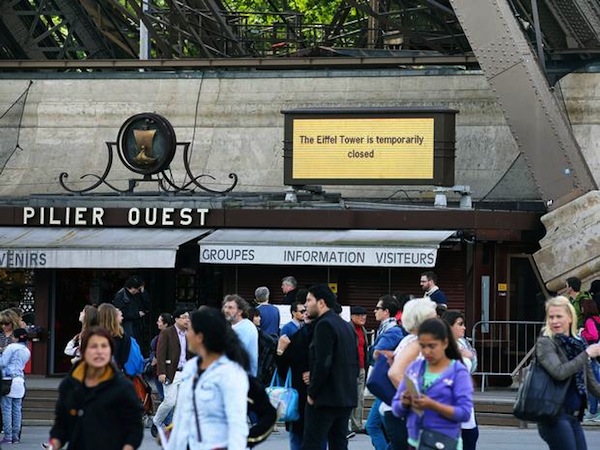Art World
Eiffel Tower Closes due to Staff Walkout against Pickpocket Gangs
Aggressive pickpocket gangs fight among themselves at the Parisian landmark.
Aggressive pickpocket gangs fight among themselves at the Parisian landmark.
Alyssa Buffenstein


The Eiffel Tower has closed due to pickpocketing concerns, disappointing tourists to the monument.
Photo via Deutsche Welle
Sorry, tourists, no panoramic views of Paris for you today—the Eiffel Tower has closed due to a staff walkout organized in response to increasingly aggressive gangs of pickpockets, who “have made life a misery” for workers and tourists, the BBC reports.
Eiffel Tower staff have requested a “formal guarantee” from the Société d’Exploitation de la Tour Eiffel (SETE), the management company that runs the tourist attraction, to stop gangs of pickpockets. SETE is currently working with the police to find a solution, and “regret that visitors…are being punished” by the closure.
Despite police reports showing a 23 percent decrease in pickpocketing so far this year compared to 2014, and the breakup of major theft networks by police, pickpocketing gangs continue to torment tourists around the tower, says the Deutsche Welle.
A striking worker told the AFP news agency that pickpockets can form gangs of up to 30 people surrounding the landmark, waiting to strike on aloof tourists. The pickpockets have become increasingly aggressive, fighting amongst themselves, and threatening and assaulting workers.
Last year, Paris attracted 22 million tourists, making it one of the world’s top tourist cities. Due to this, Paris has also become notorious for its nefarious gangs of pickpockets, and this strike isn’t the first time workers have organized in attempts to alleviate the issue. In April 2013, staff at the Louvre Museum staged a similar walkout, in response to organized assaults inside the galleries, according to the Guardian (see Besieged Louvre Museum Temporarily Grants Visitors Free Entry).
A workers’ strike has closed the Eiffel Tower before, for two days in June 2013, in a protest calling for better labor conditions and pay (see Unions Concerned by Seven-Day Opening for Paris’s Top Museums).
The Eiffel Tower, designed by Gustave Eiffel for the 1889 World’s Fair celebrating the 100th anniversary of the French Revolution, was intended to be only a temporary structure. But it soon became a worldwide symbol of the city, and today it is the most visited paid monument in the world.